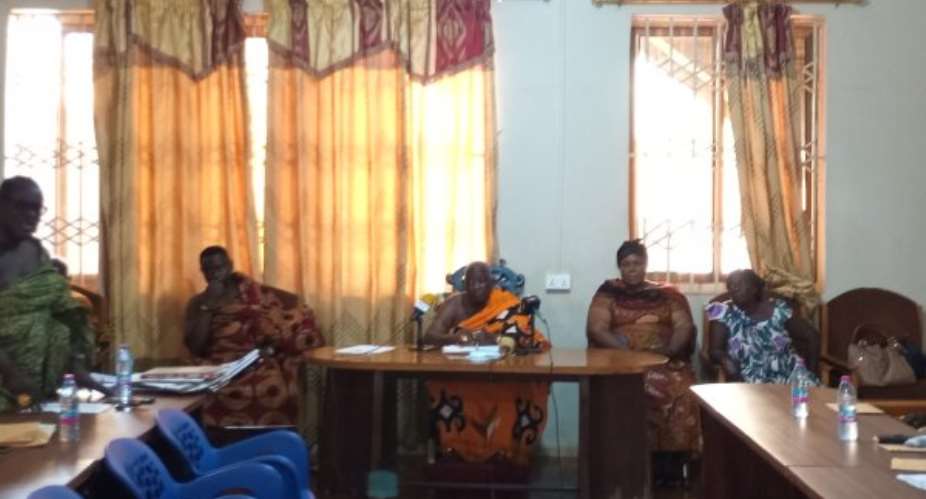The Tain II Forest Reserve, stretching from Berekum to Odumase in the Sunyani West Municipality and four others in the Bono Region are under threat of degradation because of cattle grazing by Fulani herdsmen.
The region has seven forest reserves comprising Tain I, Tain II, Yaya, Nsemere, Sawsaw, Amama and Asukese that are located within the jurisdictions of Sunyani, Sunyani West, Wenchi and Berekum Municipalities as well as Tain, Banda and Berekum West Districts.
This came to light at a press conference organised jointly by the Berekum Traditional Council (BTC) and the Sunyani District Office of the Forestry Services Division (FSD) under the Forestry Commission (FC), at Berekum in the region.
It was to appeal to stakeholders, especially the security services, the public, traditional authorities within the catchment areas of the reserves and the media to assist the government to protect the reserves.
Addressing the media, Daasebre Dr Amankona Diawuo II, the Paramount Chief of the Berekum Traditional Area and President of the Council said the destruction being caused by the Fulani herdsmen in the Tain II Forest Reserve was reported to the BTC about 10 years ago.
He said several meetings between the Council and the herdsmen had been held but they had refused to stop as the population of cattle in the Tain II Forest reserve and its adjoining areas was more than 20,000.
Daasebre Dr Diawuo II stated the free-range cattle rearing business by the Fulani herdsmen was destroying tree seedlings and food crops planted by farmers and private organisations including Form Ghana Limited.
Form Ghana Limited is a private sector forest plantation management company that provides services in the field of reforestation of degraded forest reserves and plantation management.
He said last year, President Nana Addo Dankwa Akufo-Addo launched the Green Ghana Project due to be done again on June 10 this year for the planting of 20 million tree seedlings nationwide, but the Fulani herdsmen have been recalcitrant and destroying these plantations.
Daasebre Dr. Diawuo II revealed the Traditional Council, therefore, had an agreement with the Third Battalion of Infantry (3BN) in Sunyani by formal application for the military to patrol the reserves to halt the activities of the Fulani herdsmen.
He said the stage had been set for the military to start operation to protect and save the forest reserves from the hands of the Fulani herdsmen immediately.
Earlier, speaking in an interview with the Ghana News Agency (GNA), Mr Francis Brobbey, the Sunyani District FSD Manager said the Fulani Herdsmen within the area were practicing free range cattle grazing “which is greatly degrading the Tain II and other forest reserves.
He announced last year more than 1.5 million tree seedlings were planted in the seven forest reserves in the region, explaining that the Sunyani FSD planted one million seedlings and the remaining 500,000 seedlings were planted by other organisations through Public-Private- Partnership (PPP) agreement.
He added the government was still looking for more investment into forest plantation development.
Mr Brobbey said the Tain II Forest Reserve, the biggest of the seven forest reserves covered more than 50,000 hectares of land with “a lot of investments in it”.
He stated the investments included the Green Ghana Project, Community Plantation Development through PPP agreement, the MTS (Modified Taungya System), Youth in Afforestation Programme (YIA) and Forest Investment Programme (FIP).
Mr Brobbey indicated the Sunyani FSD has employed about 1000 workers under the YIP.
He said, “the mode of destruction of the forest by the Fulani Herdsmen is causing soil compaction, food crops destruction and fire setting to burn the bush for fresh grass to grow to feed the cattle”
Mr. Brobbey lamented “the Fulani Herdsmen perpetrating illegality because they are now living in the forest reserves with their families where they even cook and do everything”.
He expressed regret the net effect of the destruction was the loss of farm produce such as maize, cassava, yam, cocoyam, vegetables and leguminous crops grown by farmers in those areas.
The degradation of the forest, Mr Brobbey added, was also accelerating climate change, destroying tree plantations and water bodies and therefore causing food insecurity, unemployment and an increase in poverty.
GNA





 We’ll no longer tolerate your empty, unwarranted attacks – TUC blasts Prof Adei
We’ll no longer tolerate your empty, unwarranted attacks – TUC blasts Prof Adei
 Bawumia donates GHc200,000 to support Madina fire victims
Bawumia donates GHc200,000 to support Madina fire victims
 IMF to disburse US$360million third tranche to Ghana without creditors MoU
IMF to disburse US$360million third tranche to Ghana without creditors MoU
 Truck owner share insights into train collision incident
Truck owner share insights into train collision incident
 Paramount chief of Bassare Traditional Area passes on
Paramount chief of Bassare Traditional Area passes on
 Two teachers in court over alleged illegal possession of BECE papers
Two teachers in court over alleged illegal possession of BECE papers
 Sunyani: Victim allegedly shot by traditional warriors appeals for justice
Sunyani: Victim allegedly shot by traditional warriors appeals for justice
 Mahama vows to scrap teacher licensure exams, review Free SHS policy
Mahama vows to scrap teacher licensure exams, review Free SHS policy
 Government will replace burnt Madina shops with a new three-story, 120-store fac...
Government will replace burnt Madina shops with a new three-story, 120-store fac...
